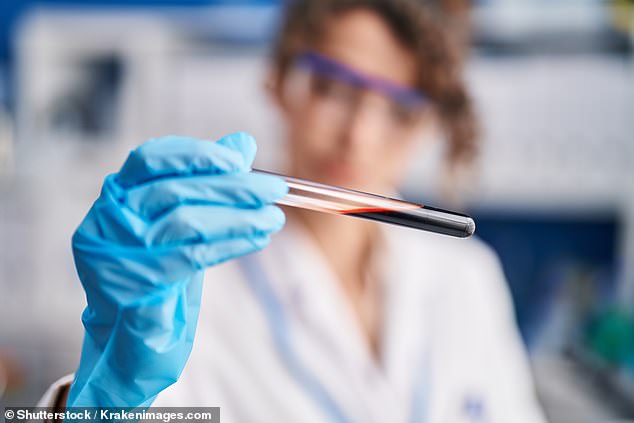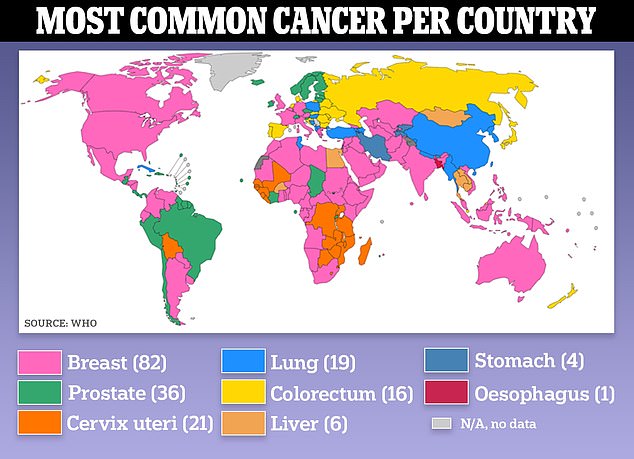- EXPLORE FURTHER: Available at no cost through the NHS: A blood test capable of detecting 12 different forms of cancer
Thousands of cancer Patients will reap benefits from this first-of-its-kind global initiative. NHS blood test that speeds up access to treatment and avoids the need for invasive biopsies.
The screening—known as a liquid biopsy—is being rolled out to around 15,000 patients with suspected lung cancer, NHS England has announced.
Plans are underway to extend this program to include advanced breast cancer patients as well, with potential expansion to prostate cancer patients in the foreseeable future.
This process involves examining bits of tumor DNA present in a standard blood sample, enabling physicians to swiftly pinpoint genetic alterations that can be addressed with specific treatments.
This indicates that treatment can commence much earlier, bypassing the wait for conventional tissue biopsy outcomes.
Authorities stated that this launch represents the first instance where an entire healthcare system globally has implemented a nationwide 'blood-test-first' strategy for detecting cancer.
The test will also be offered to around 5,000 women a year with advanced breast cancer who have not responded to standard treatment, helping doctors determine whether they are eligible for precision drugs.
Researchers are likewise investigating its application for other types of cancer such as pancreatic and gallbladder malignancies.


Lung cancer is usually identified through imaging tests and a tissue biopsy, wherein a tiny portion of the tumor is analyzed under a microscope to determine the characteristics of the condition.
Even though genetic testing can be performed on tissue, it is quite time-consuming because the samples have to be dispatched to a laboratory.
Liquid biopsies provide quicker outcomes through a much less intrusive technique.
Approximately 10,000 individuals suffering from non-small cell lung cancer, which is the most prevalent type, have already undergone this examination as part of an NHS trial encompassing 176 hospitals.
Patients undergoing liquid biopsies commenced their treatments approximately 16 days sooner on average compared to those who underwent tissue sample collection.
An independent evaluation indicates that the test has the potential to save the NHS approximately £11 million annually in costs related to lung cancer treatment.
The NHS mentioned that they were increasing testing efforts in cases of advanced breast cancer as well. Several genetic variations will now be examined, benefiting approximately 5,000 women annually.
Professor Peter Johnson, who serves as the NHS national clinical director for cancer, stated: "Liquid biopsies are ushering us into a new phase of personalized cancer treatment... it’s wonderful that we can now broaden this groundbreaking test to better customize therapy for thousands additional patients."
Professor Johnson remarked, "Advanced genomic testing is assisting us in providing more precise and gentler patient care, allowing some individuals to bypass more aggressive treatments like additional chemotherapy, thereby making a significant difference."
We are already witnessing the impact this test can have on lung and breast cancer, and we aim to introduce it for patients suffering from other types of cancer in the coming months.
'Scientists are increasingly optimistic about this method because it could enable us to examine the entire body through a simple blood test, identifying areas affected by cancer and allowing for rapid and precise treatment, thereby saving additional lives as research advances.'
The Health Secretary, Wes Streeting, mentioned that this initiative will provide "thousands of individuals with reassurance."
Professor Dame Sue Hill, Chief Scientific Officer for England, stated: "This marks a significant advancement in treatment for qualifying lung and breast cancer patients within the NHS."
This testing is revolutionizing care and enabling healthcare providers to identify suitable treatments for patients sooner, particularly when cancerous tissues might not be accessible, thereby facilitating swift and precise administration of possibly life-prolonging targeted therapies.
This test demonstrates how the NHS is leveraging advancements in genomic technology to facilitate the delivery of cutting-edge treatments to patients.
A patient who has already benefited is Rebeca Proctor, aged 41, from Carlisle, who was diagnosed with stage 4 non-small cell lung cancer in January.
A liquid biopsy showed that she had an ALK gene mutation, which made her suitable for treatment with the targeted medication Brigatinib.
A conventional biopsy validated the outcome two weeks afterward.
"When I discovered that I had stage four cancer, it was akin to getting hit in the stomach," she stated.
I felt terrified—constantly worrying about my kids and wondering if I would live to see my daughter begin nursery school.
'However, the medicine has restored my life. I've regained my vitality, and my children have their mother back.'
I understand I might not get completely better, but the therapy is stopping the cancer from advancing. We’re tackling this one day at a time and battling anything that arises.
Read more
Komentar
Posting Komentar